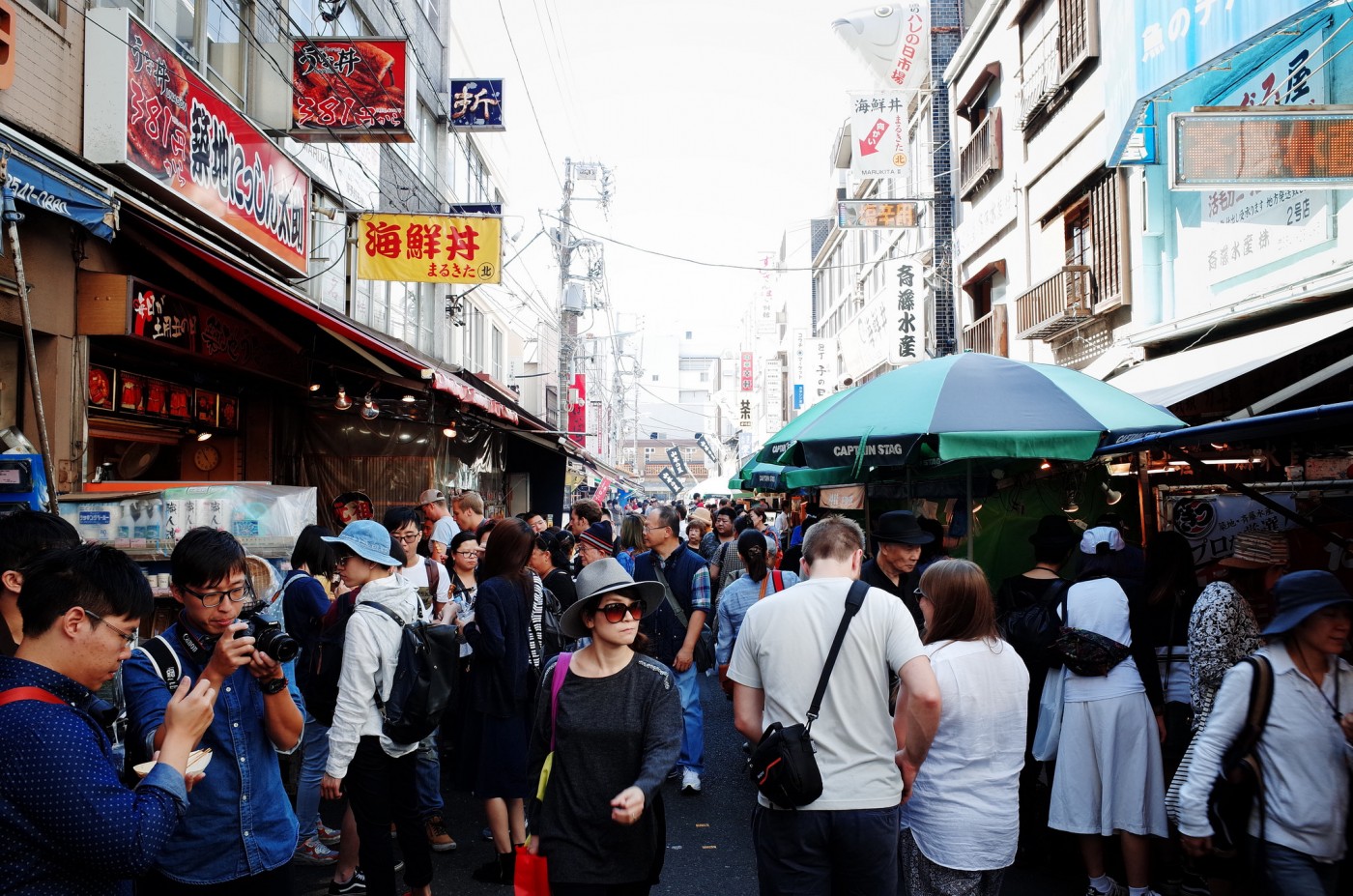The Tsukiji Fish Market
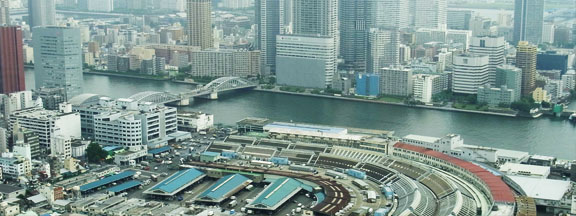
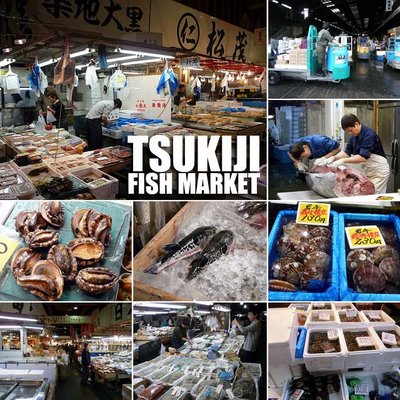
I still remember clearly my first encounter with Tsukiji Fish Market long ago. As a young sales representative for a food manufacturer, I was assigned to a new customer located deep inside the market. Everybody had told me how wild Tsukiji was and I admit it was unusual for me to go there at that time rather than going directly to wholesalers or supermarkets. The energy and lively atmosphere at the site even at 9:00 A.M. astonished me and at first sight the black Colosseum-like building took my breath away. I hesitated to proceed. However, I had to keep going. At the end of the day, my brand-new shining loafers were soaking wet and ruined. Gradually, I learned the ways of the market. In Japan rules are not always clearly written in stone; you have to figure them out through trial and error. Tsukiji is a place that denies those who don’t follow the rules.

My hotel, the Mitsui Garden Hotel Ginza, was conveniently located in Ginza, the Fifth Avenue of Tokyo, just 10-minutes by foot from the kingdom of seafood. I awoke at 3:45 am. As trucks along the street eagerly waited to load their fresh goods, I arrived at the visitor registration office at 4:15 A.M. and found it full. One of the guards told me that I would be in the second group and asked me to wait outside. According to the revised May rules, visitors were allowed on a first come first served basis to a maximum of 140 people. These were divided into two groups with the first tour beginning at 5:00 A.M. and the second one following at 5:40 A.M. No flash photos were allowed.
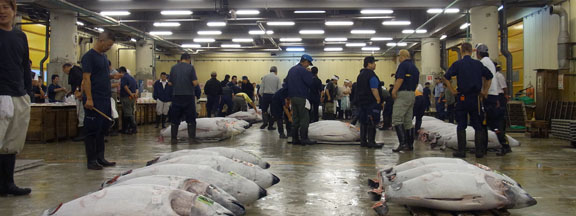
Needless to say, I could barely stay awake but I did realize that the first 70 people were already in line and I would be in the later tour. While waiting I heard many foreign languages such as English, French, German, Chinese, Russian, and even some I didn’t recognize. Surprisingly, there were very few Japanese there. Did they know what time it was? Perhaps they had jet lag and were coming directly from Roppongi without sleeping.
I saw the line reach another 70 people and the stragglers were out in the road, looking disappointed. I was joking to myself, in the middle of meditation, that the very early bird catches the tuna. After the first group departed, the second group entered the office. The guard gave me a bright yellow fluorescent vest showing that I was permitted. As another 30 minutes passed, the guard finally opened the door to the kingdom of fish.
Long the first destination for overseas tourists, Tsujiki is the world’s largest fish market handling around two thousand tons of marine products daily. With roughly 450 species, it’s overwhelming in every way. It occupies fifty-seven acres and is almost five times the size of Giant’s Tokyo Dome. A tremendous amount of tuna is hauled in every day from oceans all over the world to meet the appetite of the sushi nation and as a result the morning tuna auction is a must see. However, the auction had been closed to the public since early April because the rising number of observers were interfering with the workers. At the end of 2009, the busiest time for the market, this decision was enforced. Then next May they announced that the rules were changing and it was again reopened to visitors. It was then that I decided to revisit the 75-year-old market and check out what was new.

Then he led us to the auction area, a huge refrigerated room, full of frozen torpedo-shaped tunas lying in wait. I was amazed by this spectacular scene, which I can’t compare to anything I’ve seen before. Fishmongers were wandering around before the bidding time checking the quality of tunas with a hook-like tool and a flashlight, contemplating which was the best choice. Tuna is a gamble. They can only examine the tail of the tuna and make a split-second decision on a multi-thousand dollar bid or more. With a piercingly loud ringing bell, the auction started around 6:00 A.M. The bidders were screaming at the top of their voices from multiple podiums, shaking and swinging their arms violently. I couldn’t catch the signs which were the winning bids but fishmongers started carrying out the tunas one after another in a quick and flawless succession. There’s little time to waste to maintain the value of those tuna. They must be agile and stay aggressive to make their way back to their fishmonger bases.
I went outside the auction and moved quickly toward the restaurant area, avoiding the frantic truck traffic. Of course, no pedestrian walk was designated inside the market and you had to defend yourself against any danger. I finally reached a sushi restaurant called Daiwa, at the other side of the market. Standing in line, somebody from the house called, “Anyone alone?” That’s me! I made a miracle leap and was swallowed up into the tiny twenty-two seat restaurant. At the counter, I ordered a set sushi menu, the house recommendation, and forced myself to relax. “Can I have an Asahi beer,” I asked, like a fishmonger after work. I finished it and confirmed that the beer had hit the spot. Then, I started working on the sushi in front of me. O-toro, fatty tuna, came first and melted in my mouth quickly. Warm rice and fresh fish were a beautiful combination, which aroused me and delighted my palate. I asked the sixty-seven year old sushi master if I should use chopsticks or my hands, to which he replied with a smile “As you like.” Seeing another younger chef over the counter speaking to a guy from London, I also shared their friendly conversation with the old master while the sushi arrived one at a time. I concluded the memorable breakfast with a final sip of more beer and left.
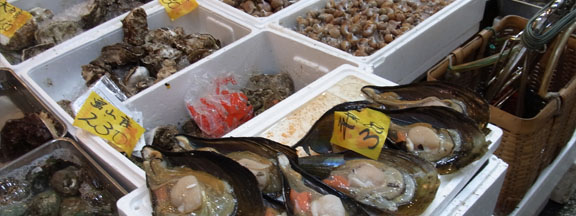
After my expedition and the discovery of things which I had never given a second thought about such as a shrine for fishmongers, shops for fish experts and chefs, and a good coffee shop, I finally decided to come back again to the market. One day is never enough to understand this vast empire. The pilgrimage must be made with reiteration. I felt pleased and relieved that Tsukiji still remained energetic, and also tolerant to outsiders who follow the rules. I also realized through my second exploration that Tsukiji is more than a mere fish market but a place where one generation succeeds to the next. You see families working together there and the most primitive business transactions taking place even in the center of twenty-first century Tokyo. I know that history and nostalgia should never be evaluated in business terms but there is a sense that this truly counts when you visit a place like Tsukiji which is so intrinsic in Japanese culture. I guarantee that you would have your own episode in compensation for the insomniac experience. I am even betting that you’ll find more.
Tsukiji Fish Market
5-2-1 Chuo-ku, Tokyo 1040045, Japan
tel 81-3-3547-8011

